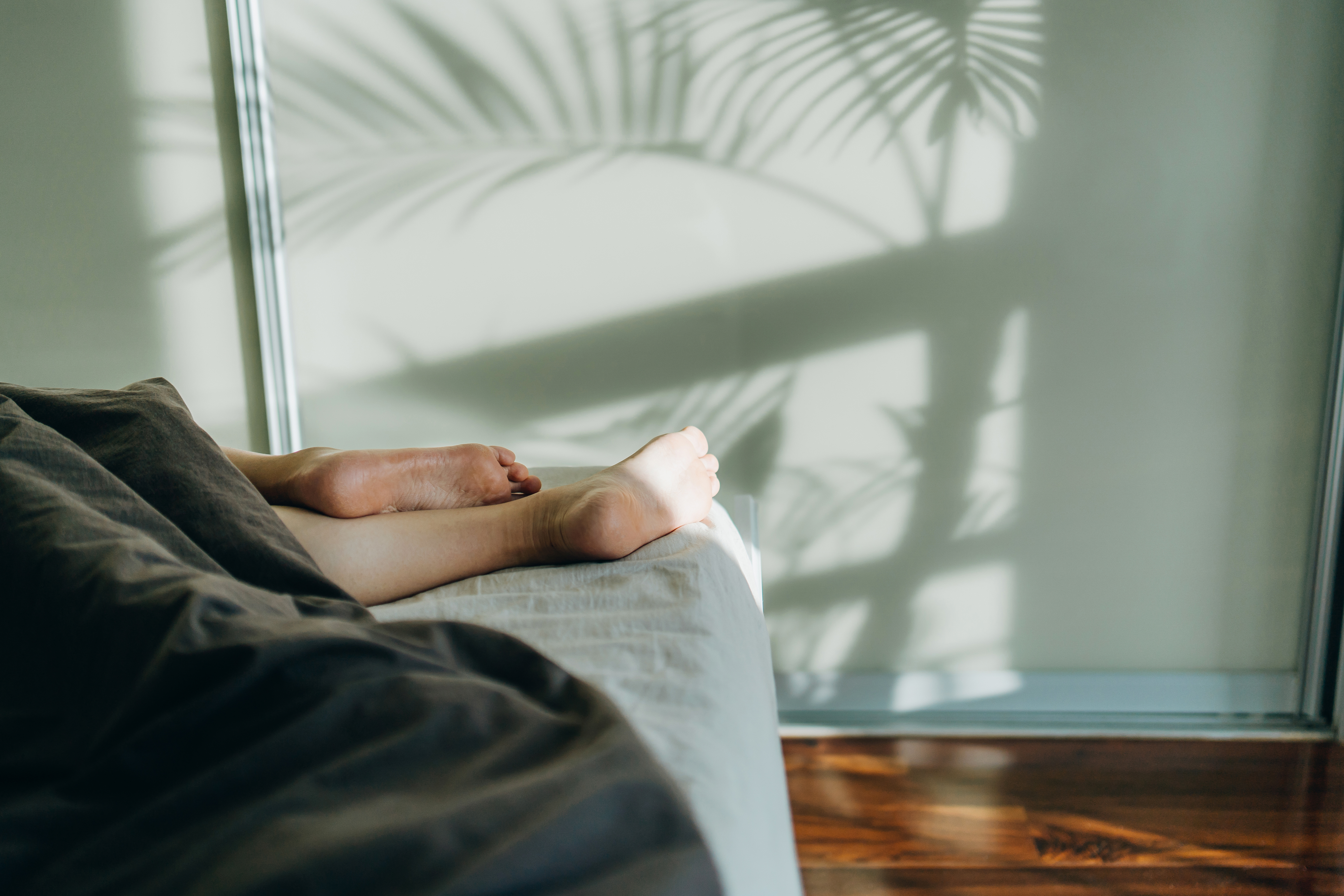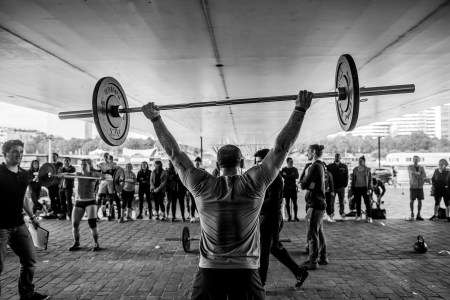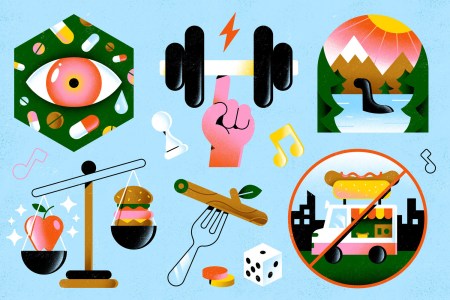The numbers suggest that the majority of Americans hate New Year’s resolutions. Only 37% of people make one at all; 43% of them will quit by the end of January — if they can even make it past January 17, the country’s unofficial “quitters day”; and only 9% of that original group “completes their resolution” (whatever that means).
Why are resolutions so hard to stick to? We think it’s sort of obvious. They’re always too lofty, and too sudden. It’s like trying to unstick a container ship by banging against either shore over and over again. Things take time to turn around.
Time of year matters, as well. Let’s say a friend of yours just spent a week working through a glazed ham. He’s had a lot to drink, too (and might still have a champagne hangover). He’s got a massive month of work ahead — the boss wants to turn a new page this year! — and his kids are back in school. Oh, and the sun has gotten into a habit of setting at 4:30 p.m. Most days the sky is a hazy, Cormac McCarthy sort of grey.
Would you tell this fellow he better join a gym and lose 20 pounds right now? No, because it would probably piss him off, right? So why would you tell that to yourself?
Instead of attempting one boogeyman-sized fitness resolution that’s doomed to fail, we recommend committing to a variety of smaller, more tangible changes in the larger wellness sphere — the sort of fare that won’t require you to upend your life on a dime, but will pay dividends for the rest of the year (and ideally, years to come).
Find our blueprint below. We’ve drafted five things to stop doing and five things to start doing: 10 resolutions in total, if you even want to call them that. We prefer to think of them as little lifestyle adjustments, or even “joys,” as it simply feels good to banish or add these to your life. Some are challenging — though none disarmingly so — and in due time, they’ll all offer you a sense of control or comfort, or hopefully both.
The Leap of Faith That Could Whip You Into Shape
Workout classes change lives. We spoke to a panel of devotees.What to Stop Doing
“Phubbing”
A stupid nickname for a not-so-nice act. Phubbing refers to “phone snubbing,” or ignoring a person who’s talking to you in favor of staring at you phone.
This habit takes a brutal toll on relationships. Phubbed significant others tend to report less satisfaction in their marriage, while phubbed children tend to become phubbers. (Phubbed people phub people!) Kids who can’t tear their parents’ attention away from phones grow up with a communication gap: they have trouble maintaining eye contact, reading facial expressions and paying attention.
This is one of those “We all know what it feels like, yet we’ve all done it anyway” conundrums, which makes a great candidate for the Golden Rule. Going into this year, commit to putting your phone down or away when someone’s talking to you — and especially if they’re opening up to you. Hopefully they treat you as you deserve, in kind. But it’s the right thing to do, regardless.
Avoiding the Doctor
This one is particularly relevant for the middle-aged men out there, who are more likely to dodge doctor’s appointments than women. Only 43% of men between the ages of 35 and 54 report seeing their doctors for annual physicals.
Meanwhile, even a quarter those who do go, according to a Cleveland Clinic survey, admitted that they customarily withhold information from their doctors, or have lied to them for years, in fear of hearing a dreaded diagnosis. We previously broke down the psychological phenomenon that’s underpinning the trend (it’s called “superhero syndrome”), but long story short, the more men avoid the doctor, the more the life expectancy gap between men and women seems to grow.
What can you do? Get some appointments on the calendar. Not just with your physician, but with your dermatologist, dentist, eye doctor and gastroenterologist (if you’re over the age of 40). This should take one hour of admin, tops, at the beginning of the year. From there, all you have to do is show up and listen.

“Rotting” in Bed
Another practice with a buzzy name, though “bed rotting” feels old and familiar, in its exhausting, Dostoyevskian way.
It more or less involves staying in bed for hours after you wake up — doomscrolling the news or social media, letting your thoughts tornado through embarrassing memories or perceived slights or anxious events on the horizon. According to doctors, the practice can exacerbate depressive symptoms.
While there’s nothing wrong with lying around and doing nothing (lazy days encourage boredom, a truly underrated state of being), staying in bed for the wrong reasons means stewing in whatever’s bothering you. This is a perfect time to practice “opposite” action, a practice preached in dialectical behavioral therapy, which involves consciously acting against the urge of negative emotions. So, get up. You don’t have to run 10 miles, but you could go for a walk, or cook an egg, or take a long shower. Whatever it takes to keep moving forward.
Drunk Shopping
Either you have no clue what this is, or you’re intimately aware, and you gulped when you saw those words. About one in five Americans shops under the influence, fueling a bizarre, $14 billion industry.
This is why we favor these smaller/zanier resolutions — you can chip away at a larger issue (like your drinking, perhaps) by working to eliminate one of its unwelcome side effects in a mindful way. That’s different than starting the year and boldly declaring you’re sober forever, or for the next 30 days, a challenge that carries its own question marks.
Drunk buyers’ product of choice is food, unsurprisingly, but shoes and clothes came in a close second. Either can be a substantial purchase. And there’s a difference between buying a T-shirt after two hours at a new brewery you really liked, or ordering a bunch of stuff from Nike just because you’ve tied one on. Ultimately, this feels like an unforced error that you can outright cut, or at least very closely monitor in the new year.
Eating Past 9 p.m.
Don’t take that time quite so literally — I’m just using it as a semi-accurate stand-in, considering the average American apparently goes to bed at 11:21 p.m.
According to the “10-3-2-1” sleep formula (which is attributable to Peter Tierney, a researcher at Lululemon), we should all cut off our caffeine intake 10 hours before bed, our eating three hours before bed, our work two hours before bed and our screen use one hour before bed. All are important, so why are we zeroing in on the eating component?
Well, late meals and midnight snacks can do some serious damage; they disrupt our circadian rhythms, making it harder to sleep and more difficult to digest food properly. (Because insulin sensitivity is lower at night, whatever you’re noshing on is more likely to be stored as fat. There’s nowhere constructive for the energy to go. Learn more about how the practice sabotages appetite hormones here.) Do what you can to protect that three-hours-before cutoff; it doesn’t mean you can’t have dessert…just eat it at 8:00 p.m. Doable?
100 Ways to Live to 100: The Longevity Fitness Guide
Coastal living, board games, not eating hot dogs. It’s all in here.What to Start Doing
Going for One Walk a Day
One of my favorite wellness facts: the Japanese lead the world in longevity, but lag seriously behind in gym memberships.
The Japanese diet plays a huge role in the country’s robust life expectancy (which is up to an absurd 84.62 years, by the way), emphasizing fish, plant-based foods, minimal sugar intake and portion control. But the other part of the equation is the culture’s constant walking — to the grocery store, to the train, to the park. The average Japanese person walks 6,500 steps a day, yet is also likely to say they “barely exercise.”
If there is anything close to a secret silver bullet in the world of wellness, it’s getting outside and walking every single day. If you’re privileged enough to have your mobility, this is the one thing you need to make sacred in your day. Walk over lunch, walk with your dog, walk while calling friends, walk while listening to a podcast, whatever. Make it so that your daily walk gets to a point where, like the Japanese, it doesn’t feel like exercise, and you can’t imagine your day without it.
Reading Before Bed
An analysis published in 2013, brought forth by the New School for Social Research, found that reading literary fiction improves one’s “theory of mind.” But what does that mean?
It’s a psychological concept with close ties to our understanding of empathy; the theory of mind refers to one’s ability and tendency to understand that other people are different, to give them credit for their unique mental states. (You have different wants, dreams, desires, influences and intentions than I do.) The researchers found that when subjects read classics by Chekhov or Dickens, or celebrated modern texts by Téa Obreht or Don DeLillo, they had a tangible “social experience.” How’s that for a finale to your nighttime routine this year? One final charge from the empathy cavalry.
In the bedroom, replace your phone with a book and try to read a chapter each night. If you’re getting tired, great. Turn the lights off. Instead of lying there thinking about the people who’ve wronged you, or the weight of a presentation you’ll have to give next week, your mind will still be fluttering over the fake problems of fictional characters. Their situations might not be real, but the impact that this process will have on your brain, the altered consciousness it ushers in, and the improvements in your sleep will be as real as it gets.

Cooking Dinner
One of my favorite “old world” things to do is visit the fishmonger. I like ordering a pound of whatever, watching him slice it, seeing how close he gets, grinning and saying “That works!” when it weighs in at 0.97 or 1.03 pounds.
Maybe that’s sad — maybe it’s a reflection of how disconnected I am on a regular basis from food preparation and production, that this process gives me a thrill. But I have urbanite friends who feel a similar way about picking up their favorite sourdough bread, or making their grandma’s gravy after selecting tomatoes from a Saturday morning market. I consider this process something to be celebrated — and something to be eagerly pursued, by all of us. It’s the spiritual antonym to ordering an oozy pad thai delivery (and paying $31 after taxes, fee and tip).
This resolution is nebulous on purpose: just try to cook a lot of dinners this year. Who cares how it goes, or how they taste at first? You’ll get better. Whatever errands this requires of you, whatever struggles or joys those errands include, whatever extra effort is required to prep and clean, whatever focus is needed to not screw the whole thing up — I’m telling you, whether you believe it or not, this is wellness. This is wellness as much as push-ups are wellness. Cooking necessitates presence of mind, it offers a well-earned reward (or a well-fought lesson), it creates human interactions, it constitutes an act of service. Take part in it.
Seeing One Show a Month
It’s sneaky easy to stop showing up to shows, especially if you’re getting older, or busier, or have dependents to think about.
But if you start missing your favorite band when they’re in town — “It’s been a long week” — what are the chances of you taking a flyer on something that isn’t necessarily in your wheelhouse? Pretty low, and that’s a shame. Attending concerts, plays and art exhibits is one of the greatest ways to increase our neuroplasticity — a term which more or less refers to the rewiring your brain experiences upon processing something different or interesting. It’s critical for maintaining a “young,” dementia-resistant brain.
Not that the whole point of seeing art is to optimize your neurotransmitters. Cultural events are the perfect arena for gathering with people, having new kinds of conversations, and feeling challenged and confused. They’re also a spontaneous way to add a memory to a day, when things are feeling too piled-up or familiar. (I’m remembering a few “experiences” I had this year that seemed to arrive at such moments, like scouting Daniel Lind-Ramos‘s scavenged sculptures at MoMA PS1, catching the delightful Shucked on Broadway, and watching a 20th-anniversary screening of Park Chan-wook’s disturbing Oldboy in the East Village. Films count, of course!) Also, I’m proud to say, I did show up when my favorite “band” was in town. Thank you, Matt Corby.
Give People Compliments
We’re wired for negativity. It’s one of our many outdated quirks as a species — sort of like sitting at a desk, feet tapping against the floor, fretting over an email as if being chased by lion.
This negativity (or tendency towards thinking we’re in extreme danger) impacts the way we perceive, judge and treat those around us, according to Michelle Rozen, Ph.D., who gave a fascinating interview on this topic to Fast Company a year back. She said at the time, “In modern times our mind is still wired to focus on the negative…[but if you compliment someone], that’s a very addictive feeling. They’ll want to know, ‘How can I work with that person?’” The more you fight back against those evolutionary instincts, and go out of your way to make someone feel good about something they’ve done, the more those people will open themselves back up to you.
Your compliment habit will have a massive impact. For one, studies indicate we undervalue the influence our compliments have on others. It means everything to them. And over time, it will have a tangible, mood-lifting effect on you, too, from just dishing them out. We tend to think that compliments need to be rare, or hyper-specific, in order to warrant being sent off into the world. But that isn’t true. They satisfy others’ need to belong, while unraveling the unhelpful, evolutionary alarm bells in your brain. Give them out like candy, and you’ll be well on your way to a year well-lived.
The Charge will help you move better, think clearer and stay in the game longer. Subscribe to our wellness newsletter today.



























